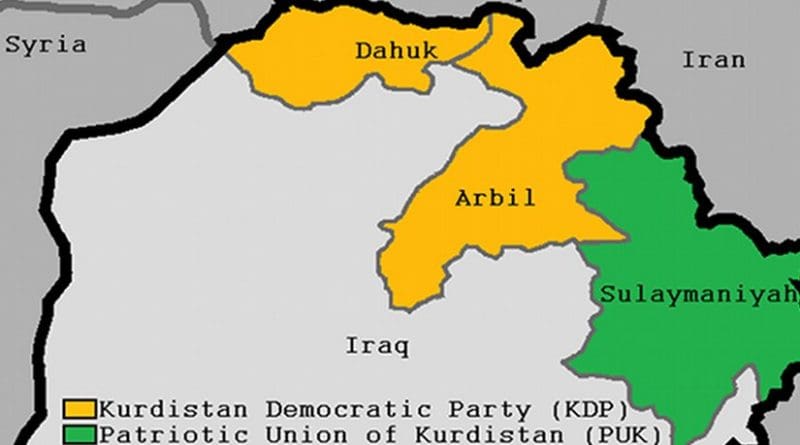Kurdistan Security Forces Arbitrarily Detaining Men, Boys Fleeing Fighting, Says HRW
Kurdistan Regional Government (KRG) security forces are arbitrarily detaining men and boys ages 15 and over who are fleeing Mosul and Hawija during the offensive against the Islamic State (also known as ISIS) in a facility near the Debaga displaced persons camp, reports Human Rights Watch.
According to HRW, the men and boys fleeing from ISIS-held territory into the KRG are being detained for indefinite periods even after they pass an initial security check for possible ties to ISIS by KRG security forces. They are denied access to lawyers and detained, sometimes for weeks, even if they are not individually suspected of a crime, while KRG authorities conduct further security screenings on them. The only legal basis for detention under national law is individualized suspicion of having committed a crime recognized in the penal code, and individuals should only be detained under criminal justice system rules.
“By categorically detaining men and boys 15 and over fleeing ISIS-held territory as possible terrorism suspects, KRG authorities are ignoring basic due process guarantees under Iraqi and international law,” said Lama Fakih, deputy Middle East director. “No one should be detained unless there is reason to suspect them personally of criminal activity.”
Human Rights Watch interviewed eight men and five women who had recently escaped from ISIS-held territory and are now in the Debaga camp for displaced people. All said that after initial screening at checkpoints, in which some men were detained, the rest of those fleeing were taken to the camp, where all men and boys aged 15 and over were separated from their families and held in a fenced area for a secondary screening, sometimes for weeks.
On October 17, 2016, the Iraqi central government and KRG authorities, with the support of an international coalition, announced the start of military operations to retake Mosul, Iraq’s second largest city, which ISIS captured in June 2014. Anti-ISIS forces have also encircled the city of Hawija, 57 kilometers west of Kirkuk and 120 kilometers southeast of Mosul, which ISIS also captured in June 2014, and began operations to retake the city. An estimated 1.2 million civilians were in Mosul and an estimated 115,000 in Hawija at the start of the operations. Since the operations began, at least 8,940 people have fled into northern Syria, the Kurdistan Region of Iraq, and elsewhere in Iraq.
Dr. Dindar Zebari, chairperson of the KRG’s High Committee to Evaluate and Respond to International Reports, provided Human Rights Watch with an explanation of KRG security force screening and detention processes for displaced persons. His explanation corroborated statements from the displaced persons interviewed by Human Rights Watch regarding the extent of the secondary screening process and the delays in executing the screenings, but also emphasized the KRG’s commitment to its human rights obligations.
Dr. Zebari said that all individuals migrating to the KRG are screened at checkpoints where their ID cards are checked against information compiled by intelligence and security agencies. He said that in addition to this, however, individuals coming from ISIS held territory are subjected to further screening. He explained that for these people, “further checks are conducted based on the intelligence agencies, national security agencies, and the local security agencies in the area.”
With regard to the Debaga camp, based on interviews with displaced people, Human Rights Watch believes that this secondary screening is happening in the fenced facility a few meters from the camp, but only for men and boys aged 15 and over.
Dr. Zebari did not give a time frame for how long these secondary screenings last, but explained that only after men and boys have passed this second screening are they transported to a displaced persons camp. He acknowledged that, “Indeed, at times this process may be time consuming based on the large number of internally displaced individuals who wish to enter the Kurdistan Region and the comprehensive process of gathering intelligence on an individual,” but emphasized “the Kurdistan Regional Government (KRG) and its Asayish security forces employ serious efforts to heed to international standards of human rights in the security screening process.”
If individuals are found to represent a security risk, Dr. Zebari said, within 24 hours they should be transferred to special courts that determine guilt, but acknowledged that “in a few cases, legal procedures for those who are suspected IS-affiliates may become delayed due to the extremely large number of IDPs who have fled IS-held areas and wish to enter the Kurdistan Region. Another reason for the delay in detention facilities is the lack of security personnel who are available to carry out more comprehensive questioning due to a lack of financial resources.”
The only legal basis for detention under national law is individualized suspicion of having committed a crime recognized in the penal code, not simply for potentially representing a security threat based on place of residence, and individuals should only be detained under criminal justice system rules.
KRG authorities should promptly inform detainees of any charges against them and allow them to quickly challenge their detention before an independent judicial body, as Iraqi law requires. They can only be held and tried for suspicion of having committed a crime.
Under international law, children may be detained only as a last resort and for the shortest appropriate period of time, and international standards state that children suspected of being recruited and used by ISIS should be treated primarily as victims, with a view to their recovery and reintegration, not punishment.
“We understand the practical need for security screening, but detaining all men and boys aged 15 and over simply because of where they are living is discriminatory, and these vulnerable people are being denied the protection they should be getting,” Fakih said. “Given what these men and boys have already endured, screening should be carried out quickly in a way that respects individual rights.”

